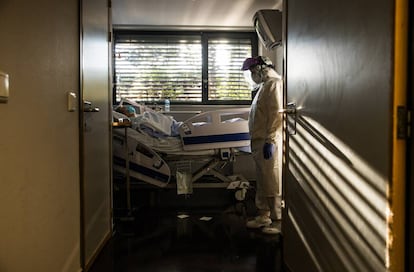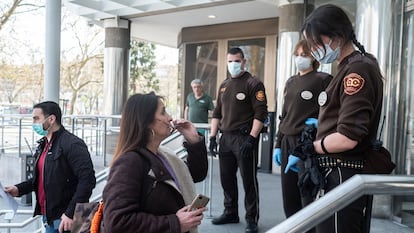Spanish Health Ministry calculates a new rise in daily coronavirus fatalities, with 585 registered deaths
Government official announces a change to the total of victims so far, which stands at 19,487, citing a “discrepancy” in the figures supplied by an unidentified region

Spain saw 585 coronavirus-related deaths in the last 24 hours, according to figures supplied on Friday morning by the Spanish Health Ministry. This was a slight rise on yesterday’s figure, which came in at 551.
So far during the coronavirus epidemic in Spain, there have been a total of 19,478 official fatalities related to the Covid-19 disease, with 188,068 confirmed infections and 74,797 patients who have recovered and have been discharged from hospital.
There are, however, inconsistencies in the official death tally. The Health Ministry reported yesterday a total of 19,310 fatalities and put that figure today at 19,487, which would indicate a rise of 348 – not 585. Fernando Simón, the director of the Health Ministry’s Coordination Center for Health Alerts, explained at the government’s daily press conference on Friday, that this was due to a “discrepancy” in the figures provided by one of Spain’s 17 regions, which he did not identify.
New cases have increased by 2.8%, a figure which has been falling since the beginning of the state of alarmFernando Simón, the director of the Health Ministry’s Coordination Center for Health Alerts
According to the Health Ministry, there were 5,252 new registered infections in the past 24 hours, a rise of 2.8% of the total, something that Simón attributed to increased testing. On Thursday, Health Minister Salvador Illa announced that Spain had carried out between 40,000 and 47,000 PCR tests every day over the past three weeks – more than double the earlier figure of 20,000 daily tests. Since the beginning of the crisis, there have been a total of 930,230 tests, according to the health minister.
Despite today’s slight rise in daily fatalities, the Spanish health authorities said on Friday that there was still a continuing downward trend for hospitalizations and ICU admissions due to Covid-19, a result of the nearly five weeks of near-total lockdown that have been in place in Spain since a state of alarm was implemented by the Spanish government on March 14.
“It is Friday of the fifth week of drastic measures,” said Health Minister Salvador Illa at a press conference on Friday. “The average increase in infections from Friday to Friday was 25.1% in the first week, 18.2% in the second, 9.1% in the third, 4.2% in the fourth and this week 2.6% despite the increase in the number of tests. [...] This leads us to conclude that the measures adopted by the government are working.”
Speaking at the government’s daily coronavirus press conference earlier on Friday, Simón said “new cases have increased by 2.8%, a figure that has been falling since the beginning of the state of alarm.” The health expert added that the number of new intensive care admissions had risen by 1.5% of the total, while fatalities had increased by 3%, which are both below the figures reported last week.
Simón warned that the number of coronavirus cases in Spain is likely to rise as more testing is rolled out. “We know that there are asymptomatic cases. Apparently it is not an excessive number. There are also many people with mild symptoms who do not contact the system and are not tested. With the increase in testing, the [number of] infections is going to increase, but I couldn’t say by how many,“ he explained.
Simón also spoke on the coronavirus death rate, which is at 10.5% compared to 13% in Italy. “Our figures are very coherent with what is happening in other countries,” he said. “Nobody has escaped the pandemic yet. In Europe, there are five countries with more than 100,000 cases, with Spain in the lead, but other countries are coming close.”
The number of daily fatalities came in at 523 on Wednesday, 567 on Tuesday and 517 on Monday. Reporting delays due to the Easter weekend are thought to have contributed to these fluctuations.
The peak of daily deaths was seen on April 2, when there were 950 Covid-19-related fatalities.
Reporting criteria

On Friday, the Spanish government published an order in the Official State Gazette (BOE) to unify the criteria used by the regions to count coronavirus deaths and intensive care admissions. Since the Spanish government declared a state of alarm on March 14 in a bid to slow the coronavirus outbreak, each of Spain’s 17 regions has been providing coronavirus figures using their own reporting methods. For instance, some regions count the number of patients admitted into the intensive care unit (ICU) since the beginning of the coronavirus outbreak, while others report how many are currently in the ward. This has made it difficult to grasp the true scale of the outbreak in Spain.
To address this problem, the government has ordered the regions to report deaths and ICU admissions in the same way. Under the new guidelines, a victim can only be counted in the death tally if they have tested positive for Covid-19 via a PCR or rapid test. The same criteria applies to confirmed infections.
The government has also asked for the following information: the total number of infections, divided into symptomatic and asymptomatic cases; the number of PCR tests carried out, total hospitalizations including ICU admissions; total ICU admissions, total number of coronavirus patients who have been discharged, and the total number of health workers who have contracted the virus.
The regions have also been asked to provide figures every Friday on material resources, such as personal protective equipment and PCR testing kits, as well as the number of health workers.
Simón said on Friday that the new process will take “some days” to be implemented. “The new order looks to obtain more detailed information given the very substantial increase in the capacity to perform PCR tests [...] The information will be given gradually according to our ability to provide it correctly,” he explained.
Impact on the courts

The Justice Ministry is considering the approval of an emergency law to mitigate the impact of the coronavirus crisis on the courts. The law, which could be ready before summer, would allow the justice system to adapt to new technologies in a bid to speed up legal processes and help clear the backlog of court activity, which has been suspended for a month due to the nationwide lockdown.
Political talks
Spanish Prime Minister Pedro Sánchez on Friday continued a round of virtual meetings with opposition parties, in a bid to start laying the foundation for what are being dubbed the “new Moncloa Pacts,” in reference to a sweeping cross-party deal in 1977 that produced a national socioeconomic recovery program and shored up Spain’s transition to democracy after the death of Francisco Franco.
The Socialist Party (PSOE) chief will talk today with the spokespersons from the Catalan Republican Left (ERC), which was key to securing Sánchez’s investiture as prime minister, the Basque group EH-Bildu, and smaller regional parties such as Teruel Existe and the Canary Coalition.
Pablo Casado, the leader of the Popular Party (PP), who has been highly critical of the government‘s handling of the crisis, announced on Friday that he will meet with Sánchez via video conference on Monday morning.
Far-right Vox, meanwhile, the third-largest group in Congress, and the anti-capitalist Catalan party CUP, have refused to take part in any meetings with the prime minister.
English version by Melissa Kitson.
Tu suscripción se está usando en otro dispositivo
¿Quieres añadir otro usuario a tu suscripción?
Si continúas leyendo en este dispositivo, no se podrá leer en el otro.
FlechaTu suscripción se está usando en otro dispositivo y solo puedes acceder a EL PAÍS desde un dispositivo a la vez.
Si quieres compartir tu cuenta, cambia tu suscripción a la modalidad Premium, así podrás añadir otro usuario. Cada uno accederá con su propia cuenta de email, lo que os permitirá personalizar vuestra experiencia en EL PAÍS.
¿Tienes una suscripción de empresa? Accede aquí para contratar más cuentas.
En el caso de no saber quién está usando tu cuenta, te recomendamos cambiar tu contraseña aquí.
Si decides continuar compartiendo tu cuenta, este mensaje se mostrará en tu dispositivo y en el de la otra persona que está usando tu cuenta de forma indefinida, afectando a tu experiencia de lectura. Puedes consultar aquí los términos y condiciones de la suscripción digital.









































